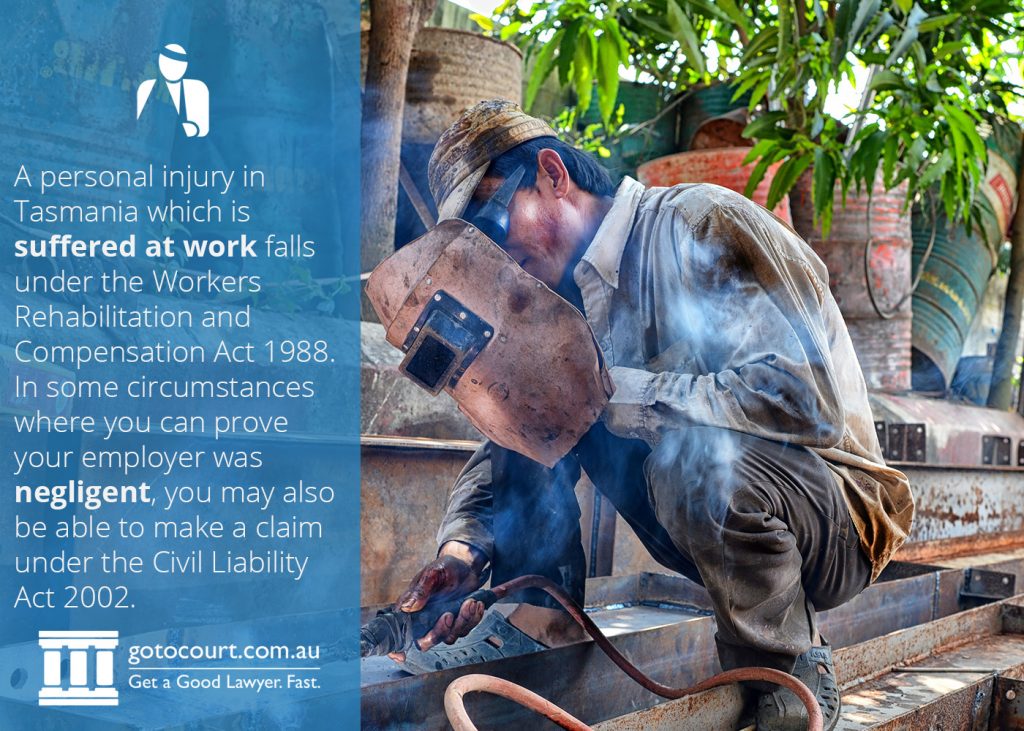Personal Injuries in Tasmania
Personal injuries in Tasmania is governed by the law of negligence under the Civil Liability Act 2002. Personal injuries practice in Tasmania also includes claims for compensation made under statutory schemes, such as the Motor Accidents (Liabilities and Compensation) Act 1973.
In Tasmania, a successful negligence claim will satisfy the court of the following:
- The negligent party (called the defendant) owed the injured party (called the plaintiff) a duty of care; and
- The defendant breached their duty of care owed to the plaintiff; and
- That breach resulted in the injury suffered by the plaintiff (called causation).
Understanding how the law of negligence applies in your particular case is important. For this reason, it is recommended that you seek legal advice if you believe you have been injured as a result of someone else’s negligence.
We operate on a no win, no fee basis. This means that if your compensation claims are unsuccessful, you will not be required to pay our fee.
Motor vehicle accidents and injuries in Tasmania
If you have been injured in a car accident, there are two ways to claim compensation. If you can establish that your injuries were caused by the negligence of a driver and you were not wholly at fault, claims under both the Motor Accidents (Liabilities and Compensation) Act 1973 and the Civil Liability Act 2002 can be made.
Under the Motor Accidents (Liabilities and Compensation) Act 1973, compensation can be paid even if you were at fault. There are a large number of exclusions, such as the following:
- Your compulsory insurance on your vehicle has not been paid. In other words, your vehicle was unregistered;
- You have been convicted of drink or drug driving and this was the cause of the accident;
- You were driving without a licence or while you were suspended;
- A manslaughter, dangerous driving or such other serious conviction has been made against you as a consequence of your driving;
- You were involved in a race; or
- The car was used by you to commit a crime of dishonesty, violence or terrorism.
This is not a complete list and it is important that you seek legal advice if you have suffered personal injuries as a result of a motor vehicle accident where you were wholly at fault.
It is a requirement that accidents are reported to police, otherwise the Motor Accidents Insurance Board will not be liable to pay compensation under the Motor Accidents (Liabilities and Compensation) Act 1973. Compensation claims to the Motor Accidents Insurance Board must be made within three months. There are special provisions within the legislation in Tasmania to allow compensation payments even if the car could not be identified or the driver could not be located.
Injuries at work
If you have suffered an injury at work or while undertaking a work-related activity, you are eligible for workers compensation. Workers compensation in Tasmania refers to claims made under the Workers Rehabilitation and Compensation Act 1988 and the Workers Rehabilitation and Compensation Regulations 2001.

Workers compensation is administered by WorkCover Tasmania under the Workers Rehabilitation and Compensation Act 1988.
WorkCover compensation
WorkCover pays compensation to injured workers in the following ways:
- Weekly payments while you are incapacitated from work;
- Payments to cover medical and other related expenses;
- Ongoing costs for rehabilitation and therapies to get you back to work; and
- Lump sum payments if you are permanently impaired.
Employers are required to be insured either through WorkCover Tasmania or be permitted to self-insure. Workers have the same entitlements to compensation regardless of whether the employer is self-insured or insured through WorkCover Tasmania.
Under the Workers Rehabilitation and Compensation Act 1988, worker is given a special legal meaning.
Worker includes the usual definition of employee as well as the following:
- Prescribed volunteers, such as volunteer firefighters;
- Taxi and luxury car drivers; and
- Workers who are paid on a commission basis.
Other types of employment are excluded so it is important to seek legal advice if you believe you have a compensation claim to lodge with WorkCover Tasmania.
WorkCover Tasmania covers a range of injuries but injuries suffered in the following situations are not covered:
- Travelling to and from work;
- Unauthorised absenteeism;
- Serious and wilful misconduct; and
- Injuries which are intentionally self-inflicted.
Diseases – asbestosis, hearing loss and cancer
Diseases, including dust and asbestos related diseases, industrial hearing loss and cancer can also be claimed under WorkCover Tasmania. You must be able to prove that your employer and the work conditions were the most significant or major factor which led to your disease.
Industrial deafness claims are limited to deafness which has occurred since 16 August 1995 and where more than five percent of binaural hearing has been damaged or lost.
In some cases, where you can prove negligence on the part of your employer you can also make a claim for negligence under the Civil Liability Act 2002.
Medical malpractice
Medical malpractice or medical negligence claims in Tasmania are made under the Civil Liability Act 2002. In addition to proving the case of negligence, medical negligence cases also involve proving that there was malpractice.
The main malpractice case law that is used in Australian medical negligence cases is Bolam v Friern Hospital Management Committee (1957) 1 WLR 582, which was later applied by the High Court of Australia in Rogers v Whitaker (1992) 175 CLR 479.
The legal principle from these cases is that doctors are required to behave in such a way which can be tested by reference of the medical profession. This means that doctors must act competently and apply their medical skill in the ways accepted by the profession at the time. These questions are determined by the courts.
A medical negligence case will arise in circumstances including the following:
- Incorrect medical advice was given in relation to the risks of the treatment provided;
- There were major and unacceptable surgical errors; or
- You were subject to an incorrect diagnosis.
Compensation on the ground of medical malpractice in Tasmania is awarded for medical expenses, pain and suffering and loss of income.
Recommended Resources
Tasmania Compensation Resources
Duty of Care in Aged Care in Tasmania
Medical Negligence in Tasmania























